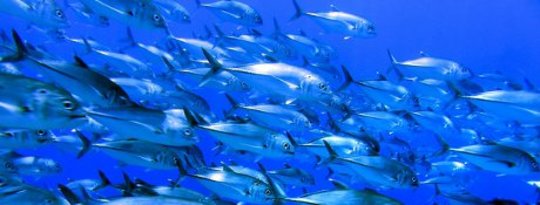
The world’s oceans are feeling the heat, and species are migrating northwards or south as their home seas begin to warm. The seas are warming more slowly than the land surfaces – but marine species are moving away from the equatorial regions at 10 times the speed of terrestrial creatures.
Twenty scientists from 17 universities and research stations in seven countries report in Nature Climate Change that they went searching for research into the impact of climate change on marine life, and found 208 peer-reviewed studies of 857 species or groups of creatures in every ocean, and then analysed the entire collection looking for patterns of change. They found them.
“The leading edge or front line of marine species distributions is moving towards the poles at an average of 72 kilometres (about 45 miles) per decade – considerably faster than terrestrial species, which are moving polewards at an average of 6 kilometres (about 4 miles) per decade,” said Elvira Poloczanska, from Australia’s Commonwealth Scientific and Industrial Research Organisation, who led the research.
“And this occurred even though sea surface temperatures are warming three times slower than land temperatures.”
The study is not the first to examine climate’s effect on ocean life: in May Canadian fisheries scientists looked at catches of 990 species from 52 marine ecosystems and devised a “fish thermometer” that could be used to measure ocean change.
Poloczanska and her colleagues cast their net even more widely. They built up a database of observations charting 1,735 changes in marine life spanning intervals that varied from 19 to more than 300 years, to check on distribution, phenology – the measure of seasonal change – abundance, community change, calcification and demography.
They included those papers that found no significant change, and those that could not make a direct connection between climate change and species shift. But 96% of the papers they looked at cited temperature as the important factor in climate change; the rest were concerned with changes in ocean chemistry, sea level rise or the loss of sea ice.
‘Overwhelming’ response to warming
The researchers also found evidence that the ocean spring – that vital moment when the life begins to quicken and breeding cycles resume – is advancing at the rate of four days per decade, twice as fast as the rate on land.
The front-runners in the race for spring were the invertebrate zooplankton and the larvae of bony fish, which arrived up to 11 days earlier.
Mike Burrows of the Scottish Association for Marine Life said: “Most of the effects we saw were as expected from changes in climate. So most of the shifts in the distributions of, say, fishes and corals, were towards the poles, and most events in spring time, like spawning, were earlier.”
Pippa Moore, of Aberystwyth University in Wales, said: “These results highlight the urgent need for governments around the world to develop adaptive management plans to ensure the continued sustainability of the world’s oceans and the goods and services they provide to human society.”
And Camille Parmesan, of the University of Texas at Austin, another of the authors, said: “Here’s a totally different system with its own unique set of complexities and subtleties.
“Yet the overall impacts of recent climate change remain the same: an overwhelming response of species shifting where and when they live in an attempt to track a shifting climate. This is the first comprehensive documentation of what is happening in our marine systems in relation to climate change.” – Climate News Network




























